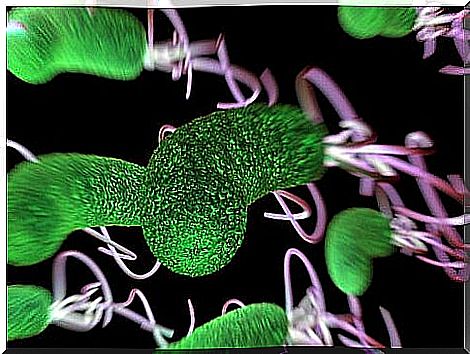Albendazole: Indications And Contraindications
Albendazole is a drug that comes from benzimidazoles, whose main indication is the treatment of different diseases caused by the infestation of parasitic microorganisms, both intestinal and tissue.
Its use is allowed in both adults and children over 2 years of age in a single dose or in short-term treatment.
How does albendazole exert its effect on the body?

The antiparasitic effect of albendazole is due to the effect it produces on microtubules found in the cytoplasm of parasite cells. It has no effect on human cells. By damaging these structures, the antiparasitic manages to break the cells and, thus, they lose the ability to perform their functions, such as secretory or absorptive.
In this way, secretory substances accumulate in the parasite’s Golgi apparatus and, as a consequence, glucose uptake and glycogen values as an energy reserve decrease.
Furthermore, as most of these substances that accumulate in the Golgi apparatus are proteolytic enzymes that are released within the cell , an autolysis of the involved cell eventually occurs; that is, the death of the cell itself. Thanks to this, the parasite is killed.
Indications of albendazole
In studies with albendazole, the efficacy of this antiparasitic in treating infections caused by:
- Enterobius vermicularis.
- Ascaris lumbricoides , which is a roundworm.
- Ancylostoma duodenare and Necator americanus , two other worms.
- Trichus trichiura .
- Strongyloides stercoralis .
However, it is not only indicated for infections caused by these microorganisms. It is also used for the treatment of infections by Hymenolepis nana and Taenia spp , which are responsible for producing tapeworms.
At what dose is this medicine administered?

The doses of albendazole, as well as the dosage, will vary according to the age of the patient and the disease to be treated. Thus, in adults a single dose of 400 mg will be administered orally for the treatment of ascariasis, enterobiasis and hookworm.
As for diseases such as whipworm, tapeworm or fasciolosis as well as serious infections, a daily dose of 400 mg will be administered for 3 days. In the case in which the clinical picture does not revert after 3 weeks, the second line of treatment should be started for this type of disease.
Children over two years of age follow the same regimen as adults, and for those under two years of age, albendazole is contraindicated.
Contraindications to the administration of albendazole
Albendazole, despite having been shown to be safe in clinical trials, is contraindicated in a number of situations. In this sense, when a patient has known hypersensitivity to this drug or to the excipients that are part of the formulation, they cannot be treated with it.
In addition, as we have mentioned, albendazole is used and approved for adults and children over two years of age. Therefore, younger children cannot be treated with this drug.
On the other hand, its use in pregnant or lactating women is not recommended, due to its possible effects on the baby, since teratogenic and embryotoxic effects have been demonstrated in animal studies.
Finally, mention that interactions with other medications are not known. For this reason, if you are going to take another medication together with albendazole, it is essential that you discuss it with your doctor or pharmacist, in order to avoid health complications.
Adverse reactions

Like all drugs on the market, albendazole is not without producing a number of adverse effects.
We understand adverse effects as all unwanted and unintended events that are expected in treatment with a drug. In this sense, during treatment with albendazole, the following adverse reactions have been frequently reported in clinical trials:
- Elevation of liver enzymes.
- Gastrointestinal problems, such as stomach pain, nausea, and vomiting.
- Leukopenia, which is a decrease in the number of white blood cells, a type of blood cell.
- Dizziness and headaches.
- Hair loss
- Fever.
Additionally, although not as frequently, cases of pancytopenia, granulocytopenia, and bone marrow aplasia have been reported.
Conclution
Albendazole is a drug that is used to treat parasitic diseases. It is essential to make a rational use of this medicine, since misuse of it can have serious health consequences. You can consult with both the doctor and the pharmacist any questions you have in this regard.









